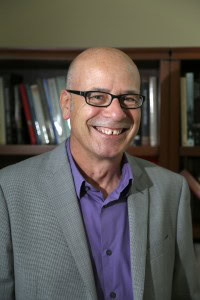AHA members are involved in all fields of history, with wide-ranging specializations, interests, and areas of employment. To recognize our talented and eclectic membership, AHA Today features a regular AHA Member Spotlight series.
 Colin J. Davis is a distinguished professor and chair at the University of Alabama at Birmingham. He lives in Birmingham, Alabama, and has been a member since 1989.
Colin J. Davis is a distinguished professor and chair at the University of Alabama at Birmingham. He lives in Birmingham, Alabama, and has been a member since 1989.
Alma maters: BA history/sociology, University of Warwick, England, 1978–81; MA history, Binghamton University, 1981–83; PHD history, Binghamton University, 1989
Fields of interest: transnational labor history, women’s labor history, labor history & film
When did you first develop an interest in history?
As a young boy in England I was always interested in war, especially, World War II. At the age of 14, I was introduced to political and social history by my schoolteacher Bill Wegg. He focused on World Wars I and II, the Russian Revolution, the Troubles in Northern Ireland, and the Vietnam War.
What projects are you working on currently?
At present I am working on a transatlantic study of deep-sea fishermen and their wives. My focus is on the 1960s and early 1970s, and how the twin factors of inclusion and exclusion colored fishing in this period. This period witnessed fishing on a post-industrial scale, as factory ships and fleeting devastated remaining fish stocks off the coasts of the USA, Iceland, and Europe.
Another project on a similar theme is how fishing communities on the Gulf of Mexico and the Indian Ocean have tried to bar foreign fishers from entering their communities. On the Gulf it was Vietnamese fishers, while on the Indian Ocean it was attempts by Australian authorities and communities to rid themselves of “invading” Indonesian fishermen.
Have your interests changed since graduation? If so, how?
Very definitely. I have moved from working on single national history (the US) to transnational or comparative labor history.
Is there an article, book, movie, blog etc. that you could recommend to fellow AHA members?
The most interesting and thought-provoking book I can recommend is Jeffrey Bolster’s The Mortal Sea: Fishing the Atlantic in the Age of Sail. The book is a Bancroft Prize winner and details the steady deterioration of Atlantic fish stocks due to overfishing. Bolster does an excellent job of showing how local authorities in colonial America and beyond attempted (unsuccessfully) to regulate the capture of fish and whales. It’s a sober reminder about how overfishing has decimated fish stocks, so that fishers have to go further out into the Atlantic Ocean in search of dwindling fish supplies.
What do you value most about the history profession?
I think it’s the shared interest in discovering not just an historical truth, but also its successful attempts to contextualize the historical process. So, in my department of history, for example, different areas of interest are unified by the craft of historical enquiry and understanding. The give and take I witness in the corridors convinces me that historians of every stripe share a love of the discipline/craft that transcends time and geography.
Why did you join the AHA?
It was to join an established collection of scholars and activists. The AHA creates multiple forums for the young and more advanced historian to share their insights and research.
Do you have a favorite AHA annual meeting anecdote you would like to share?
I think my first serious job search at the AHA meeting. Watching other job candidates go through a similar process enabled me to rationalize the feeling of estrangement. That is, while it was a terrifying and uncomfortable experience, it nonetheless was a shared experience.
Other than history, what are you passionate about?
I brew my own beer. Indeed, I grow my own hops (cascade and nugget) and utilize available fruits such as fig to produce a unique blend. Once achieved, I’m able to watch the English Premier League with a pint of home brew in my hand.
Any final thoughts?
I truly believe I have the best job in the world. After serving an apprenticeship as a tool and die maker, I know the grinding experience of clocking in and out. As an historian my love of the profession provides me with the self-discipline to work, and work hard. Another joy is transferring this love of history to students and young colleagues alike. Thus reviewing manuscripts and articles, rather than being a burden, is an opportunity share one’s expertise while enjoying reading something that is new and invigorating.
This post first appeared on AHA Today.
This work is licensed under a Creative Commons Attribution-NonCommercial-NoDerivatives 4.0 International License. Attribution must provide author name, article title, Perspectives on History, date of publication, and a link to this page. This license applies only to the article, not to text or images used here by permission.
